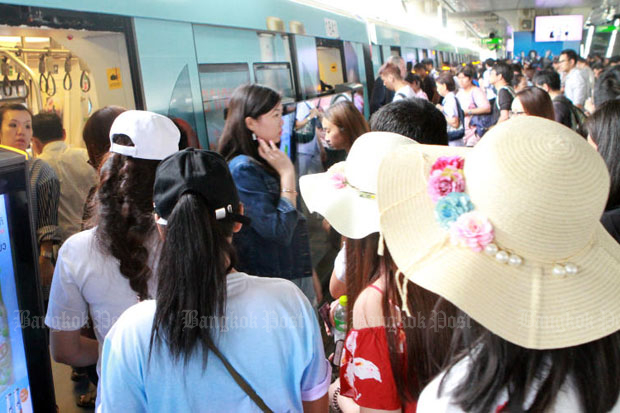
Bangkok Mass Transit System Plc (BTSC) on Tuesday evening reported a new signals problem and warned of further delays, blaming radio interference and the installation of a new signalling system.
At 3.50pm, BTS reported another problem with its signal system and warned commuters of slow trains, longer stopovers at stations and further delays after the morning commute was disrupted.
The operator stated via its Twitter account at 6.15am that a train broke down between Chong Nonsi and Surasak stations and trains would be delayed for 10 minutes. It advised commuters to allow more time for their trips.
Five minutes later it stated the delayed train was repaired and removed from its system and train services would be 10 minutes late.
At 6.26am, BTSC said its signals system malfunctioned on both the Sukhumvit and Silom lines and caused about 10 minutes of delay to some trains passing the Siam station. It apologised for the inconvenience.
Similar delays occurred between 6am and 10am Monday, causing many BTS stations to overflow with commuters and drawing strong complaints.
Delays are expected through Friday, the operator said.
BTSC chief executive officer Surapong Laoha-unya on Tuesday again apologised to commuters. He attributed the disruption to the ongoing installation of a new radio system to cover signalling for all 52 trains and every station in the company’s electric railway network, including the southern extension in Samut Prakan province.
The replacement of the radio system has affected service stability and caused malfunctions, he said, adding that the task would be finished on Friday.
Mr Surapong added that over the past two weeks, BTS trains had frequently been delayed by interference from high-powered outside radio transmissions with the signalling system, especially at Prompong, Asok and Siam stations. The trains had to be slowed down for safety reasons as a result, he said, causing congestion.
Takorn Tanthasith, secretary-general of the National Broadcasting and Telecommunications Commission, said earlier on Tuesday that his office was using radio signal detection equipment to verify BTSC's previous assertion that train service was disrupted by radio signals from high-rise buildings alongside the tracks.